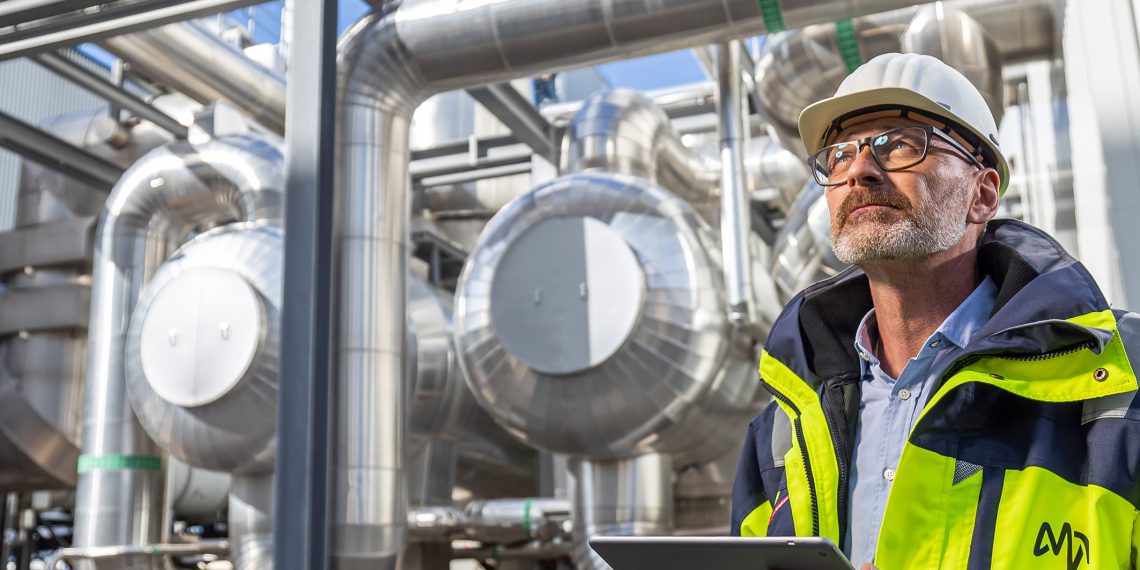MVV Energie, an energy company in Germany, is once again stepping up the pace in its course towards climate neutrality, the company announced at a press conference. For example, the energy company aims to achieve a CO2 reduction of at least 80 percent by 2030 compared to 2018.
“And we’re going even further: by 2040, we not only want to become climate-neutral — after 2040, our future will even be ‘climate-positive’. In other words, we will remove greenhouse gases from the atmosphere again.”
- Dr. Georg Müller, Chairman of the Board of Management
To achieve this, in addition to the electricity turnaround and the associated expansion of renewable energies, as well as supporting its customers in their decarbonization, the energy company is focusing above all on the heating turnaround. MVV calls this approach the “Mannheim Model”. “The heating turnaround is perhaps the most important key to achieving climate neutrality from the company,” said Dr. Müller, adding, “MVV will make its own district heating business in Mannheim and the region climate neutral much faster, namely already in the decade now underway.” The energy company is thus gaining further momentum in its climate protection activities.
One million tonnes of CO2 saved five years ahead of schedule
In view of the political framework in Germany and the European Union in terms of climate protection, the company once again sees itself as a pioneer. Climate protection and the energy turnaround are the clear maxims for action. The company sees the decarbonization of the economy and society as a key task in which the energy industry, as one of the major emitters, is intensively challenged, according to Dr. Müller: “The expansion of renewable energies, electromobility, the heat turnaround, smart cities: all this can only be achieved with energy and only by using climate-friendly technologies.”
This principle was also followed by the ten-year targets by 2026 that the company had already set itself in 2016 — specifically, doubling the portfolio of its own renewable generation capacity by 2026, installing 10. 000 megawatts of generation capacity based on renewable energies, the creation of a climate-neutral administration, and the saving of one million metric tons of net CO2 emissions by 2026. “We have already achieved the goal of saving one million metric tons of net CO2 emissions this year — five years ahead of the original deadline,” announced the CEO.
Heat turnaround at the heart of achieving climate neutrality
As Germany’s third-largest district heating company, the MVV Group supplies district heating not only to Mannheim and parts of the Rhine/Neckar metropolitan region, but also to the cities of Kiel and Offenbach via its subsidiaries. Nationwide, a good third of Germany’s CO2 emissions currently still come from the areas of hot water and heating in buildings. The Group is now turning its district heating green step by step and converting its district heating operations in Mannheim and the Rhine/Neckar metropolitan region entirely to green energy sources by 2030 at the latest.
“We are facing the future task of reinventing district heating for the second time,” explained Dr. Müller. “In doing so, we are relying on the broadest of all green power and heat portfolios of German energy companies: the use of waste heat from waste treatment and biomass, sewage sludge recycling, the use of renewable energies such as biomethane, of river heat pumps, and of new opportunities in the field of geothermal energy and industrial waste heat.”
Contribution to achieving Paris climate protection agreement
With its strategic orientation, MVV is clearly committed to the goals of the Paris Climate Protection Agreement. To this end, in addition to converting its district heating supply and developing customer-related solutions, the energy company is also consistently pressing ahead with the coal phase-out already agreed politically. Emissions from conventional generation positions will be successively set to zero. And the company is also keeping up the pace of expansion for renewable energy to generate electricity and green heat. Electricity generation based on renewable energies will be doubled again by 2026 — as was already the case between 2010 and 2016.
“Mannheim Model”: MVV to become climate-positive from 2040 onwards
“Germany wants to be climate-neutral by 2045, and we want to be climate-neutral by 2040. But our Mannheim Way doesn’t end there. Instead, we are going even further. We are looking beyond 2040 and then even want to become climate positive,” explained Dr. Müller. That’s why we will decarbonize the waste treatment plants in the long term through CO2 capture and thus develop them into CO2 sinks.

















